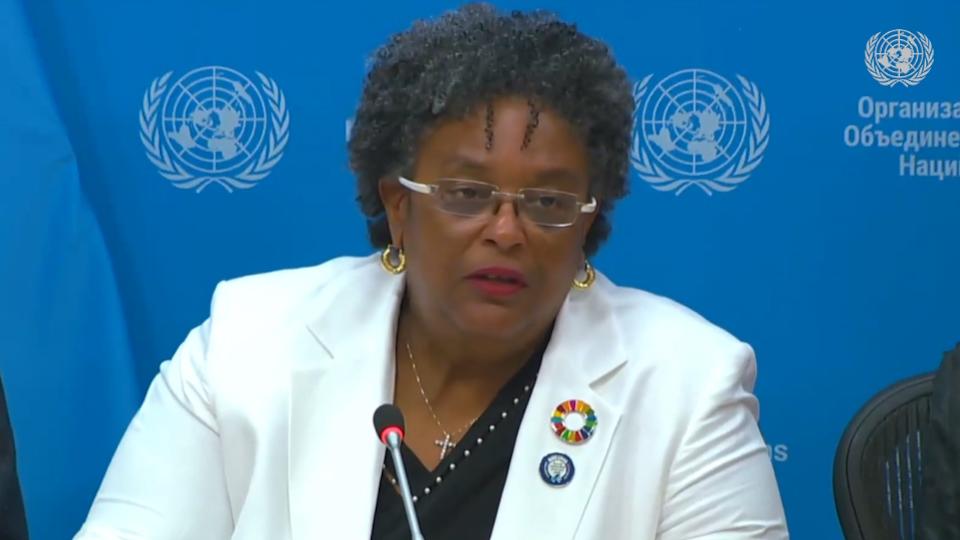World leaders seek 10% cut in antibiotic resistance deaths

HE Mia Mottley, prime minister of Barbados, who chairs the Global Leaders Group on AMR
In a landmark development, world leaders meeting at the United Nations officially adopted a political declaration on antimicrobial resistance (AMR), which includes a target of a 10% cut in deaths related to AMR by 2030.
Other key elements in the declaration include the creation of a $100 million fund to help low- and middle-income countries (LMICs) respond to the AMR crisis, the establishment of an independent science-based panel to advise on strategies, and the acknowledgement that drug-resistant tuberculosis (DR-TB) is a critical emerging threat.
A new global action plan on AMR should be drawn up by 2026, and there will be a review meeting in 2029 to gauge progress. This is the first declaration on AMR at the UN level in almost a decade.
Mia Mottley, the prime minister of Barbados who chairs the Global Leaders Group on AMR, told a press briefing ahead of the UN high-level meeting that AMR is already claiming a million lives a year directly, and indirectly another four million, and without action could become the number one cause of death worldwide by 2050.
Mottley stressed the importance of the independent panel, suggesting efforts to curb AMR could face pushback from industrial lobbies, and pointed to the role of independent scientific advisors in counteracting climate change deniers.
She also said there was a deliberate intent to set a "modest" target for fundraising to support LMICs, emphasising that money would go not towards research into new antibiotics, but to ensure "equitable and affordable access for the global population."
She told reporters more than 20 pharmaceutical companies were working on new antibiotics in 2000, but that has now reduced to four, largely because of the difficulties in recouping the cost of investment, and the pipeline of new drugs is now "alarmingly dry."
Describing a world in which a minor injury, childbirth, and dental treatment could become a life-threatening event, Mottley said: "This is a press conference not for us with grey hair so much, but for the young people of the world, because they're the ones who will have to face the possible threat of a reversal of a century of medical progress in what we dub the silent, slow-motion pandemic."
The declaration has another key element, and that is setting up a quadripartite secretariat with representatives from not only the health sector, but also from food, agriculture, and the environment, as all have a role to play in tackling the problem.
The secretariat will include the World Health Organization (WHO), World Organization for Animal Health (WOAH), the Food and Agriculture Organization (FAO), and the UN Environment Program (UNEP), reflecting the role of antimicrobials leaking into nature through municipal waste, wastewater, agricultural discharge, pharmaceutical production, hospitals, farms, and overuse of antimicrobials on crops.
UNEP Under-Secretary-General Inger Andersen acknowledged that "we are in deeper trouble than we thought," citing a recent study in The Lancet suggesting that between 2025 and 2050 there could be 40 million direct deaths and 160 million indirect deaths as a result of AMR.
Pharma's contribution to be problem is particularly evident in the global south "where we do have pharmaceutical production, but not adequate wastewater management and treatment," said Anderson.
Medical charity Médecins Sans Frontières (MSF), speaking ahead of the UN meeting, said that the declaration would be a "welcome step" in the fight against AMR, but called on governments to take "swift, bold action" to translate this political declaration into meaningful progress.
"We are seeing staggering rates of drug-resistant infections in many of the low-resource and humanitarian settings where we work, in large part because healthcare workers don't have what they need to prevent, detect, and respond to AMR," said Dr Christos Christou, MSF's international president.
"Considering the magnitude of the challenge of AMR, though, and how few of the hardest-hit countries have been able to fund and implement national action plans, the declaration text should have been much more concrete and ambitious," he added.
"The declaration must now go beyond words on paper."












